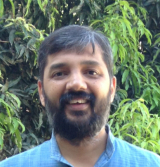Overview
On October 29th, 2014, we were honored to co-host Professor Deepak Malghan (Centre for Public Policy, Indian Institute of Management (IIM) Bangalore, Fung Global Fellows Program, Princeton University) for "Why all hydrology is social hydrology: Evidence from Bangalore, India" with the Brace Center for Water Resources Management .
Talk Abstract
Why all hydrology is social hydrology: Evidence from Bangalore, India
Presentation Slides
![]() deepak_malghan_why_all_urban_hydrology_is_social_hydrology.pdf
deepak_malghan_why_all_urban_hydrology_is_social_hydrology.pdf
About the speaker

Dr. Deepak Malghan is an ecological economist with primary interest in theoretical models of the economy-ecosystem interaction problem. He is currently revising a book manuscript, On Being the Right Size: Scale, Ecosystem, and Economy that attempts to reformulate ecological economics from a “scale” perspective. Deepak is also beginning a new multi-year book project (provisionally titled Citius, Altius, Fortius: A History of How the World Became Efficient). This project aims to uncover the global social and intellectual history of the idea of efficiency from its origins in the Scottish Enlightenment to the present time. His empirical research interests include social hydrology and ecological distribution. Malghan’s research is highly interdisciplinary and routinely uses technical tools from economics, chemical engineering, historical analysis, hydrology, and ecology. Deepak is on the faculty of Centre for Public Policy at the Indian Institute of Management Bangalore where he directs the Ecological Political Economy Lab. He is also a Fung Global Fellow at the Princeton Institute for Regional and International Studies, Princeton University. Malghan holds a Ph.D. in ecological economics from the University of Maryland and MPA from Princeton University.